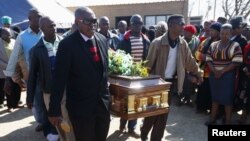JOHANNESBURG, South Africa — Illegal strikes have spread to gold mines in South Africa, weeks after platinum miners launched an illegal strike that culminated in a deadly shooting by police. On Monday, 12,000 gold miners held an illegal strike at one mine as police shot rubber bullets and tear gas at strikers at another mine.
Mining firm Gold One said Monday that about 60 people gathered near its flagship mine near Johannesburg. That group included workers who had been dismissed in June for holding an illegal strike. Gold One said police fired tear gas and rubber bullets at the crowd.
The French news agency quotes police as saying that four miners were shot.
Also Monday, Gold Fields Limited said that about 12,000 workers at one of its mines were refusing to return to work in an illegal strike.
Five of South Africa’s top ministers gathered Monday in Johannesburg to assure the public - and investors - that the government has the situation under control.
Their insistence follows weeks of criticism and political backlash over the government’s handling of the August 16 clash at the Lonmin platinum mine in Marikana, where police shot and killed 34 striking workers.
Labor Minister Mildred Oliphant said Monday she is optimistic that aggrieved workers at Lonmin are considering an accord that could get them back to work by Tuesday.
Mineral Resources Minister Susan Shabangu repeatedly said that the nation plans to hold mining companies to account for the poor living and working conditions that miners say led them to seek the pay raise.
And Minister in the Presidency Collins Chabane said at least three times that South Africa is a stable constitutional democracy and is in control of the situation.
“The tragic incident at Marikana is not a reflection of the business environment in South Africa," said Chabane. "We would like to reassure all stakeholders and the international community that mining conditions continue unhindered in other parts of the North West province and throughout the country. Government remains in control of the situation and law and order continues to prevail."
A South African court prepared to release a group of detained Lonmin miners on Monday.
Two-hundred-seventy detainees were charged last week with murder under a little-used “common purpose” law that had been used in the apartheid era against black activists. That law implicated the crowd for inciting the clash that led to the striking workers' deaths by police gunfire.
Prosecutors' decision to charge the miners sparked a strong public outcry, and on Sunday, the nation’s top prosecutor ordered the murder charge to be provisionally dropped as investigations continue.
The National Prosecuting Authority said its decision to drop the charges was not politically motivated.
Mining firm Gold One said Monday that about 60 people gathered near its flagship mine near Johannesburg. That group included workers who had been dismissed in June for holding an illegal strike. Gold One said police fired tear gas and rubber bullets at the crowd.
The French news agency quotes police as saying that four miners were shot.
Also Monday, Gold Fields Limited said that about 12,000 workers at one of its mines were refusing to return to work in an illegal strike.
Five of South Africa’s top ministers gathered Monday in Johannesburg to assure the public - and investors - that the government has the situation under control.
Their insistence follows weeks of criticism and political backlash over the government’s handling of the August 16 clash at the Lonmin platinum mine in Marikana, where police shot and killed 34 striking workers.
Labor Minister Mildred Oliphant said Monday she is optimistic that aggrieved workers at Lonmin are considering an accord that could get them back to work by Tuesday.
Mineral Resources Minister Susan Shabangu repeatedly said that the nation plans to hold mining companies to account for the poor living and working conditions that miners say led them to seek the pay raise.
And Minister in the Presidency Collins Chabane said at least three times that South Africa is a stable constitutional democracy and is in control of the situation.
“The tragic incident at Marikana is not a reflection of the business environment in South Africa," said Chabane. "We would like to reassure all stakeholders and the international community that mining conditions continue unhindered in other parts of the North West province and throughout the country. Government remains in control of the situation and law and order continues to prevail."
A South African court prepared to release a group of detained Lonmin miners on Monday.
Two-hundred-seventy detainees were charged last week with murder under a little-used “common purpose” law that had been used in the apartheid era against black activists. That law implicated the crowd for inciting the clash that led to the striking workers' deaths by police gunfire.
Prosecutors' decision to charge the miners sparked a strong public outcry, and on Sunday, the nation’s top prosecutor ordered the murder charge to be provisionally dropped as investigations continue.
The National Prosecuting Authority said its decision to drop the charges was not politically motivated.




